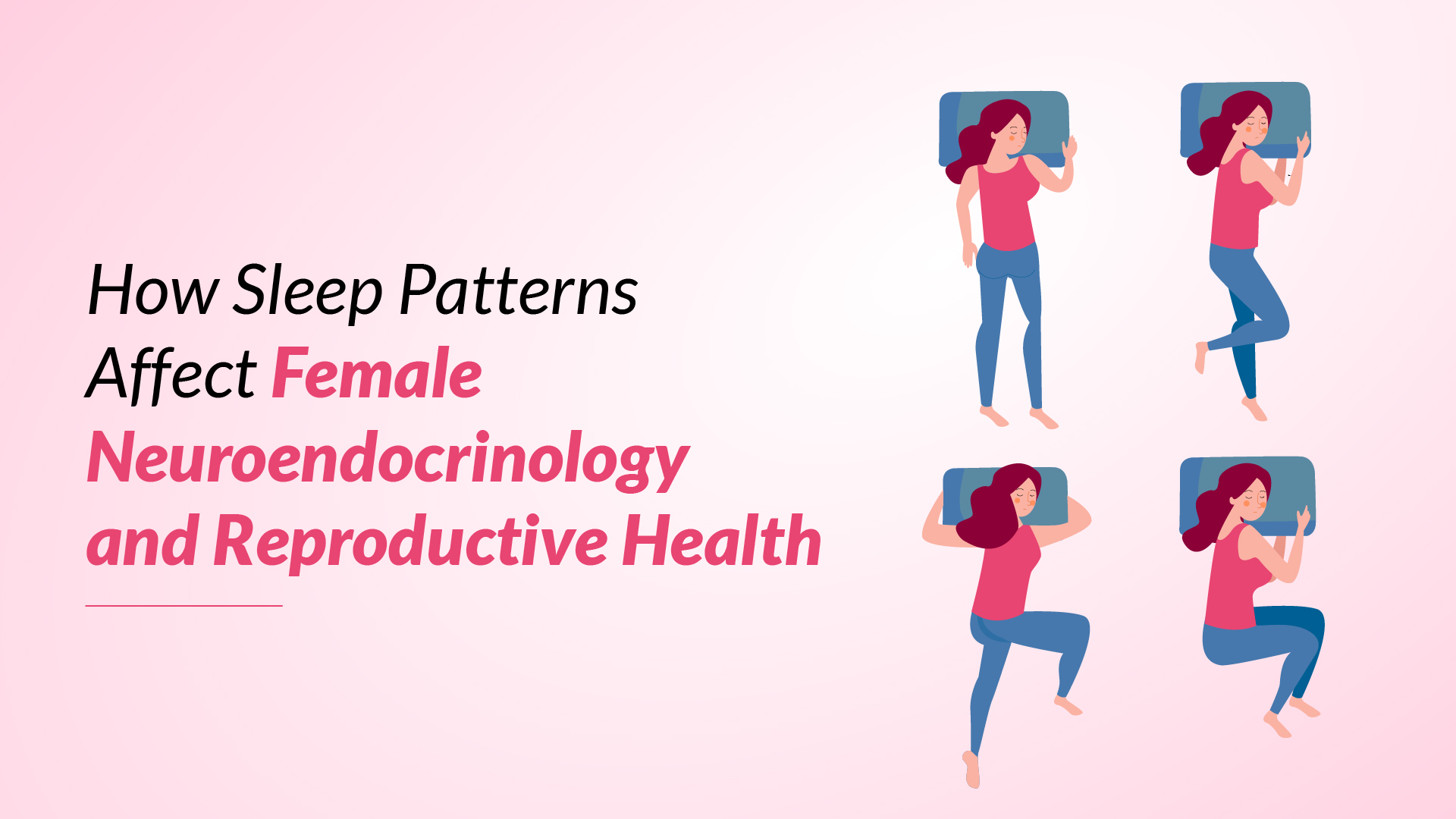How Sleep Patterns Affect Female Neuroendocrinology and Reproductive Health
Reviewed By: Dr. Deepthi Damodara, fertility specialist at Ferty9 Fertility Center, Tirupati
Have you ever wondered how your sleep patterns might affect your ability to conceive or maintain a healthy pregnancy? Sleep is not just a basic human need; it plays a crucial role in regulating female hormones and overall reproductive health. Unfortunately, modern lifestyle choices often lead to poor sleep, disrupting this delicate balance. Research shows that up to 45% of women experience poor sleep quality at some point in their reproductive years, and it's well-documented that sleep and women's health are closely linked. But the good news is that by improving sleep quality, we can often restore hormonal balance and enhance fertility.
Let's explore how sleep patterns impact female neuroendocrinology, fertility, and reproductive health and how you can take steps to improve both.
The Science Behind Sleep and Fertility
Sleep has a direct effect on the body's hormonal regulation, particularly in women. Female hormones and sleep are closely connected, as critical reproductive hormones like estrogen and progesterone are influenced by sleep quality. During deep sleep, the body undergoes processes like tissue repair and hormonal regulation, which are essential for healthy ovulation, menstruation, and pregnancy. Poor sleep, on the other hand, disrupts this cycle, negatively impacting fertility.
Women's sleep hormones, like melatonin, which regulates the sleep-wake cycle, also play a role in reproductive health. Melatonin has antioxidant properties that protect eggs from oxidative damage. Therefore, poor sleep can affect sleep and egg quality, reducing the chances of conception, especially in treatments like IVF.
Effects of Sleep Deprivation on Female Fertility
Sleep deprivation can have profound effects on women's reproductive health. Women who consistently get less than the recommended amount of sleep may experience irregular menstrual cycles, anovulation (no ovulation), or even sleep apnea and female infertility. Sleep loss disrupts the hypothalamus-pituitary-ovarian axis, which controls reproductive hormones like FSH, LH, and estrogen.
Additionally, sleep deprivation and pregnancy complications have been noted. Pregnant women who suffer from sleep deprivation face higher risks of preeclampsia, gestational diabetes, and preterm birth. In extreme cases, lack of sleep causes miscarriage by increasing stress levels and negatively affecting hormone regulation.
For women nearing menopause, sleep becomes an even bigger concern. Menopause insomnia is a common issue, as hormonal shifts lead to fragmented sleep, hot flashes, and night sweats. The link between menopause and sleep problems also extends to lower fertility rates, as these hormonal changes disrupt ovulation.
Effects of Sleep Deprivation on Male Fertility
While the sleep-fertility link is more frequently studied in women, the impact of sleep on male fertility should not be overlooked. Men who suffer from chronic sleep loss may experience reduced testosterone levels, which affect sperm quality and motility. The stress caused by sleep deprivation can lead to erectile dysfunction, further reducing the chances of conception. Conditions like sleep apnea and male fertility issues are also mirrored in men, as untreated sleep apnea reduces oxygen levels and disrupts overall health, impairing reproductive abilities.
Sleep Disorders and Infertility
Sleep disorders like insomnia and restless leg syndrome can significantly contribute to infertility. Women with sleep apnea are more likely to experience reproductive challenges, as the condition increases stress hormones like cortisol. Elevated cortisol levels can interfere with ovulation, affecting a woman’s ability to conceive. In some cases, sleep apnea also leads to obesity, which is a well-known factor in infertility.
Women undergoing fertility treatments, such as IVF, are especially vulnerable to the effects of poor sleep. In fact, there is a known connection between IVF and sleep, as women with poor sleep quality tend to have lower success rates during fertility treatments. This highlights the importance of addressing and handling sleep issues before embarking on fertility treatment plans.
How to Improve Sleep for Better Fertility
Fortunately, there are ways to improve sleep patterns that can boost fertility:
- Establish a consistent sleep schedule: Going to bed early and waking up at the same time every day helps regulate the body’s circadian rhythm, which is crucial for hormonal balance.
- Create a sleep-friendly environment: Keep your bedroom cool, dark, and quiet. This is especially important for women experiencing menopause insomnia, as it helps alleviate hot flashes and night sweats.
- Limit screen time before bed: Try to limit the exposure to blue light from mobile screens. This reduces melatonin production, disrupting women's sleep hormones and leading to poor-quality sleep.
- Manage stress: High stress levels can affect both sleep and fertility. Incorporate relaxation methods like yoga or meditation into your everyday routine to reduce stress.
- Regular Exercise: Engaging in physical exercise can help regulate sleep patterns and improve hormonal balance. However, it is important to avoid vigorous physical exercise close to bedtime.
- Monitor your diet: Eating a balanced diet rich in vitamins and minerals supports hormonal balance and improves sleep. Avoid heavy meal consumption during dinner, as they can interfere with sleep quality.
- Avoid caffeine and alcohol before bedtime: Alcohol and caffeine can disrupt your sleep cycle. Limit their consumption, especially in the evening, to promote better sleep and enhance fertility.
- Seek medical advice: If you suspect any sleep disorder, consult with a healthcare provider for proper diagnosis and treatment.
These changes can improve both sleep quality and overall reproductive health, giving women a better chance at conception and maintaining a healthy pregnancy.
Find Hope and Solutions for Infertility Problems—Explore Our Comprehensive Services
IUI Treatment
PICSI Treatment
ICSI Treatment
Fertility Preservation Service
Blastocyst Culture & Transfer Treatment
Conclusion
In summary, sleep plays an important role in maintaining sleep and women's health, fertility, and reproductive function. Poor sleep not only disrupts hormone levels but also increases the risk of pregnancy complications. By focusing on better sleep hygiene, addressing sleep disorders, and maintaining a balanced lifestyle, women can improve their fertility outcomes. If you're experiencing sleep issues and trying to conceive, consider seeking professional help from fertility experts like those at Ferty9 Fertility Center, who can guide you through personalized care.
Visit Our Clinic:
Fertility Clinic in Hyderabad
Fertility Clinic in Visakhapatnam
Fertility Clinic in Vijayawada
Fertility Clinic in Karimnagar
Fertility Clinic in Warangal
Fertility Clinic in Rajahmundry
Fertility Clinic in Kurnool

Write your message
FAQ's
How many hours of sleep are ideal for optimal fertility?
Most specialist doctors prescribe at least 7-9 hours of sleep per night to maintain fertility and hormonal balance.


